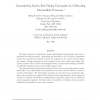Free Online Productivity Tools
i2Speak
i2Symbol
i2OCR
iTex2Img
iWeb2Print
iWeb2Shot
i2Type
iPdf2Split
iPdf2Merge
i2Bopomofo
i2Arabic
i2Style
i2Image
i2PDF
iLatex2Rtf
Sci2ools
RTSS
1994
IEEE
1994
IEEE
Guaranteeing End-to-End Timing Constraints by Calibrating Intermediate Processes
This paper presents a comprehensive design methodology for guaranteeing end-to-end requirements of real-time systems. Applications are structured as a set of process components connected by asynchronous channels, in which the endpoints are the system's external inputs and outputs. Timing constraints are then postulated between these inputs and outputs; they express properties such as end-to-end propagation delay, temporal input-sampling correlation, and allowable separation times between updated output values. The automated design method works as follows: First the end-to-end requirements are transformed into a set of intermediate rate constraints on the tasks, and new tasks are created to correlate related inputs. The intermediate constraints are then solved by an optimization algorithm, whose objective is to minimizeCPU utilization. If the algorithmfails, a restructuring tool attempts to eliminate bottlenecks by transforming the application, which is then re-submitted into the ...
Control Systems | End-to-end Propagation Delay | End-to-end Requirements | Intermediate Rate Constraints | RTSS 1994 |
| Added | 09 Aug 2010 |
| Updated | 09 Aug 2010 |
| Type | Conference |
| Year | 1994 |
| Where | RTSS |
| Authors | Richard Gerber, Seongsoo Hong, Manas Saksena |
Comments (0)

